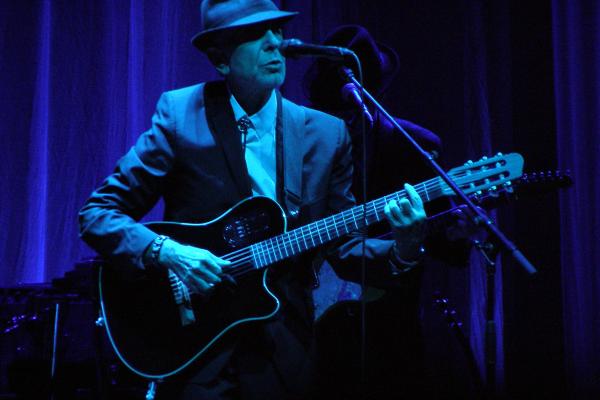On September 21, Leonard Cohen Turned 80. With or Without a Cigarette, It’s Time to Celebrate.
“I hope I stay on the road a little bit longer - but you may not be so enthusiastic when you hear my reason. You see I want to start smoking next year when I'll be 80. It's been a long barren time. I think it’s the right age to recommence.” —Leonard Cohen
I dreamed you were in Florence, singing on some stage. Your back was to the men, the women by your sides. Your melody was tranquil, just humming do-re-me-fa, la-fa-re-me-do. And when there was commotion, some men quarreling behind the scene, you turned and faced them calmly, beseeching, “Gentlemen, let’s sing.”
You have left us these past months, ceased your universal tour. It gives us time to miss you, and wonder what you mean. This week you will be eighty, there’s no question, you are old. Your bones may creak or ache and I’ll guess your heart’s a little tired, but from outside looking in you seem settled in a pretty gentle space.
So in the dream your melodies kept coming, like a river from its source. “You’re doing it,” someone shouted. “It’s exactly what we want!” People were casually swaying until your voice started to get hoarse. “Well, I’m glad you like it,” you croaked joyfully, “I call this solemn mingling my little Florentine Prayer.”
The questions started rising, one from every man, about the origins of prayer and the source of all good songs, until a woman interrupted, as if to make a joke, but she got it, she really knew, there was only one thing left to ask: All we need to know is, Dear Leonard will you smoke?
It’s a bit you’ve done forever, we hear your humble cry. You just really want to let us know, you are not that pious guy. You might have learned a thing or two about misery and faith, but as soon as you are eighty we’ll find you cigarette in hand, dragging on and on while the band plays “Marianne.”
I read there will be more books published about your life, as many as twelve or fourteen are coming to our stores. I’ve even heard it said you are a prophet or a saint, but I have a quarrel with such blasphemers, for ruining your name. You belonged to old Vienna in Herzl’s literary prime, tailored suits and bourgeois hats, when it was the providence of poets to solve every single crime. But I doubt you’d have shared their politics, no matter what the Field Commander says. You have too much loving-kindness to let some Politburo waste your time.
For a deracinated Jew, you’ve really made your place. Montreal was not too bad, even better than New York. You could not be more traveled from your reverential tours, but there remains a provincial twang in your self-deprecating faith. Your voice is not a channel, a spigot, or a fountain. We get it; you’re a soldier, waging war for every word.
They say wisdom is like an ocean, infinitely deep. But think about the logic of the chapter and the verse. When liberation comes, the holy writ is not revealed first. Before the meddling of letters in the commandeering script, the exodusing slaves learn the Song of the Sea by fleeing across the ocean floor, where music has its source.
Some Balinese fishermen, who had not yet heard about the problems of the Jews, stumbled onto a similar idea. In Bungaya, I am told, before all memory began, a sacred gamelan was washed ashore by the waves. People carried its iron instruments into the mountains, learning to play from a raven perched in a tree who sang five different modes and all the melodies elaborating on the modes. But this is not the incredible part of the story. Even before the gamelan beached itself, like some penitential whale, the people of Bungaya heard its music from beneath the waves. As they listened (or maybe because they were listening?) the instruments appeared on the surface of the water, the music still sounding.
Perhaps it’s as you say, and you have a narrow range, but your atmosphere of antiquity and impurity is extremely hard to fake. Only old men know, to handle the pressure of freedom is harder than it looks. We need a spirit that is calm. Time won’t be controlled. There’s no more wisdom in the rush.
The old man knows one other thing, the same as Arjun learned. To disarm your evil spirits, means mastering the tongue. So when our minds and forms betray us, just sing, just keep singing right along. You’ve thanked us in your concerts, for sustaining all your songs. You sang us to your love, with your second-hand technique. We’ve waltzed and prayed and gotten down, it’s you who should be thanked. Thanks for all the music, and the way you make our bodies pray. Let your precious age be praised, your breath auctioned by the breeze. With or without a cigarette, just sing, just sing Leonard, please.
Shefa Siegel, from Vancouver, British Columbia, writes about environment, ethics, and religion. His essays appear in Haaretz and Ethics & International Affairs, and he advises governments on mineral resource policies. He wrote about Leonard Cohen as the “irreverent master of prayer” in the March 2013 Sojourners magazine.
Image: Leonard Cohen in Florence in 2010 / Route66 / Shutterstock.com
Got something to say about what you're reading? We value your feedback!
